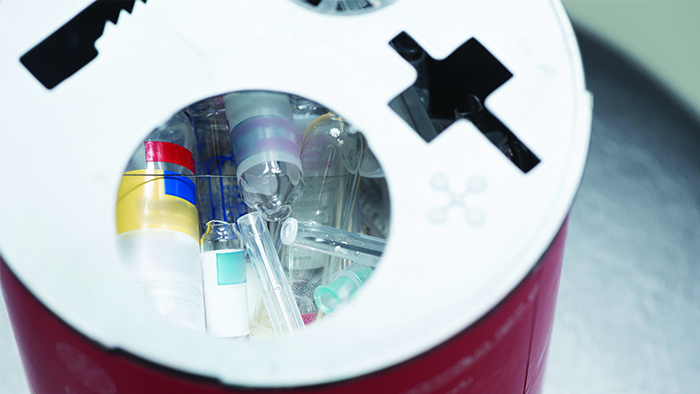It’s No Longer Gossip--Final RCRA Pharmaceutical Waste Rule
- By [ Caroline Niery ]
- 01/04/2019

As a quick reminder, this rule sets standards for the handling of hazardous waste pharmaceuticals. This rule applies to healthcare facilities and reverse distributors that "generate and manage hazardous waste pharmaceuticals" and not to pharmaceutical manufacturers. The term "healthcare facility" is fairly broad and in addition to treatment facilities it includes "any person that is lawfully authorized to … distribute, sell, or dispense pharmaceuticals, including over-the-counter pharmaceuticals, dietary supplements, homeopathic drugs, or prescription pharmaceuticals." As a result, health clinics and retailers of pharmaceuticals are affected by the rule.
EPA did not go forward with its proposal to classify all pharmaceuticals sent by a healthcare facility (the definition of which includes many retail facilities) to a reverse distributor as wastes starting at the healthcare facility. While EPA did finalize this approach for prescription pharmaceuticals, it reaffirmed that non-prescription pharmaceuticals and other retail items managed by a reverse logistics center are not wastes at a retail store if they have a reasonable expectation of being legitimately used/reused or reclaimed.
The new requirements are in 40 CFR Part 266, Subpart P – Management Standards for Hazardous Waste Pharmaceuticals and Amendment to the P075 Listing for Nicotine.
EPA acknowledged common sense by excluding "patches, gums and lozenges that are FDA-approved over-the-counter nicotine replacement therapies" from the P075 acutely hazardous listing in the final rule. Importantly, the Agency did not re-classify these items as non-acutely hazardous wastes, but rather excluded them from RCRA regulation entirely.
However, this exclusion from RCRA does not include e-cigarettes, e-liquids, or prescription nicotine replacement therapies.
Close up your drains because EPA finalized the prohibition on sewering hazardous waste pharmaceuticals. While drain disposal of non-hazardous pharmaceuticals are not covered by this ban, EPA discourages this practice. Traces of medicines are turning up in streams and lakes and the impact that drain disposal will have on the ecosystem and human health is still unknown.
The final rule will be published in the Federal Register in the coming weeks (could that be delayed because of the partial government shutdown?) and will become effective at the federal level six months after publication. The prohibition on sewering will take effect in all states at that time.
However, the rest of the rule will generally not become effective in the states until they act to adopt the rule (except for states like Iowa and Alaska that do not have their own authorized hazardous waste programs, or states like New Jersey and Pennsylvania that automatically incorporate new federal hazardous waste rules). All authorized states must eventually adopt the rule as EPA is taking the position that Subpart P, as a whole, makes the federal program more stringent than before (even though there are some less stringent elements). However, because the new exclusion for nicotine patches, gums, and lozenges is a less stringent provision, states will not be required to adopt that exclusion.
For useful links on Changes to RCRA, visit the CRC Hot Topics Page. To stay up to date on this and other regulatory changes, sign up for RCC Alerts.
by Caroline Stec (Contact) at 2:28 PM in Retail, Legal/Regulatory Affairs, Sustainability


